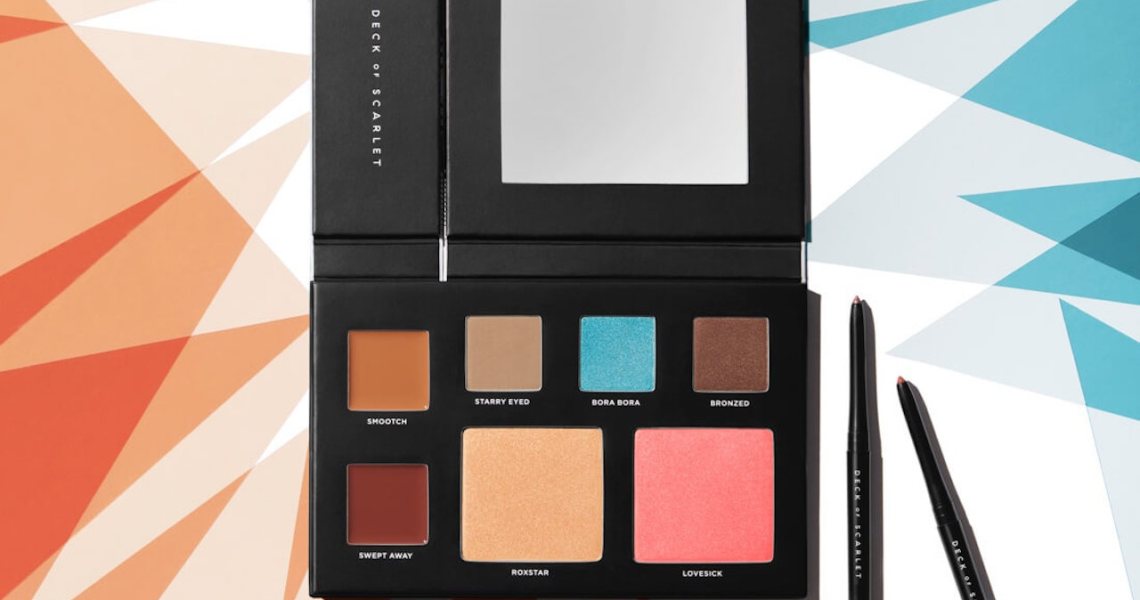On Tuesday, subscription company Deck of Scarlet revamped its brand positioning to become a clean beauty brand focused on high-performance, full-coverage products.
In March 2017, Deck of Scarlet launched selling full-face makeup palettes via subscription but added à la carte palettes at a higher price in June of the same year. It transitioned into a clean vegan brand in 2019. Now, the brand is looking to fill whitespace between innovative makeup products, while maintaining a clean point of view. Moving forward, it will launch makeup collections, which will include products like blushes and bronzers, as well as individual products like aerosol foundations. They won’t be available through the subscription. On Tuesday, it debuted three products, and it plans to roll out a major launch every quarter.
“While our subscription is successful, it is formulaic,” said Mariya Nurislamova, Deck of Scarlet founder and CEO. “That formula is [creating] full-face palettes, and we feel a little bit constrained with just having to create makeup palettes. At this point, we’ve created more than 25 palettes, and you can only go so far with it.”
The clean makeup category has gained traction over the last two years, as customers have become familiar with clean skin-care and are now turning their attention to makeup. Brands like Ilia, RMS Beauty and Lawless have entered retailers like Sephora, attracted investors and gained significant followings on social media. Kosas also recently expanded into body care, demonstrating the strong positioning of clean makeup brands. But as Jeniece Trizzino, Deck of Scarlet vp of product development pointed out, many clean makeup brands initially struggled with offering adequate color cosmetics or have been held back from unique product delivery mechanisms, like aerosols, due to clean ingredient limitations.
“One of the main things that we saw is that makeup customers want innovation in both color and format,” said Trizzino. “When we saw the clean beauty movement pick up, we recognized a whitespace opportunity. There are clean makeup brands doing kind of run-of-the-mill basic formulas, or there are [non-clean] brands doing first-to-market formulas, but there is no one in the middle.”
Deck of Scarlet’s core customers are 25- to 45-years-old. Eighty percent of customers subscribe; there are presently 20,000 subscribers. About 17% of Deck of Scarlet customers also subscribe to the perfume subscription brand Scentbird, of which Nurislamova is also co-founder and CEO. Nurislamova declined to state Deck of Scarlet sales. Deck of Scarlet is frequently cross-promoted to Scentbird via email to its more than 400,000 subscribers. The new products and brand direction will be shared with Deck of Scarlet and Scentbird customers via email and when they visit the Deck of Scarlet homepage and log on to their online accounts.
Deck of Scarlet’s relaunch also arrives at a time when the market dynamics around makeup are shifting dramatically due to Covid-19. Deck of Scarlet initially expected to relaunch in April, but postponed due to coronavirus. During the last four months, sales for categories like body care, fragrances and cosmetics oscillated. Cosmetics, in particular, experienced a sharp decrease: Lipgloss saw a 22% decline in U.S. sales between January and April, according to NPD Group. Meanwhile, sales of eyebrow products grew by 42%, and eyeshadow and mascara sales rose 27%, according to Edited.
Ad position: web_incontent_pos1
“The new normal will still contain makeup, because it makes women feel good,” said Nurislamova. “Not much about how we envision the brand or its future has changed because of Covid-19, but instead, how we market it has changed.” That includes remaining focused on DTC, but forgoing any potential pop-ups. She added that subscriptions did not drop during the onset of coronavirus.




